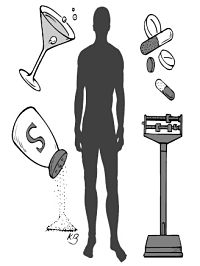Let's Talk About Risk Factors for Stroke
February 17, 2011
Why is it important to know my risk for stroke?
Knowing your risk for stroke is the fi rst step in preventing stroke. You can change or treat some risk factors, but others you can't. By having regular medical checkups and knowing your risk, you can focus on what you can change and lower your risk of stroke.
What risk factors can I change or treat?
High blood pressure. This is the single most important risk factor for stroke because it's the No. 1 cause of stroke. Know your blood pressure and have it checked at least once every two years. If it's consistently 140/90 or above, it's high. Talk to your doctor about how to control it.
Tobacco use. Don't smoke cigarettes or use other forms of tobacco. Tobacco use damages blood vessels.
Diabetes mellitus. Having diabetes increases your risk of stroke because it can cause disease of blood vessels in the brain. Work with your doctor to manage diabetes and reduce other risk factors.
Carotid or other artery disease. The carotid arteries in your neck supply most of the blood to your brain. A carotid artery damaged by a fatty buildup of plaque inside the artery wall may become blocked by a blood, clot, causing a stroke.
TIAs. Transient ischemic attacks (TIAs) are "mini strokes" that produce stroke-like symptoms but no lasting eff ects. Recognizing and treating TIAs can reduce the risk of a major stroke. Know the warning signs of a TIA and seek emergency medical treatment immediately.
Atrial fi brillation or other heart disease. In atrial fi brillation the heart's upper chambers quiver rather than beating eff ectively. This cause the blood to pool and clot, increasing the risk of stroke. People with other types of heart disease have a higher risk of stroke, too.
Certain blood disorders. A high read blood cell count makes clots more likely, raising the risk of stroke. Sickle cell anemia increases stroke risk because the "sickled" cells stick to blood vessel walls and may block arteries.
High blood cholesterol. High blood cholesterol increases the risk of clogged arteries. If an artery leading to the brain becomes blocked, a stroke can result.
Physical inactivity and obesity. Being inactive, obese or both can increase your risk of cardiovascular disease.
Excessive alcohol intake. Drinking an average of more than one drink per day for women or more than two drinks a day for men raises blood pressure. Binge drinking can
lead to stroke.
Illegal drug use. Intravenous drug use carries a high risk of stroke. Cocaine use also has been linked to stroke.
What are the risk factors I can't control?
Increasing age. Stroke aff ects people of all ages. But the older you are, the greater your stroke risk.
Gender. In most age groups, more men than women have stroke, but more women die from stroke.
Heredity and race. People whose close blood relations have had a stroke have a higher risk of stroke. African-Americans have a higher risk of death and disability from stroke than whites, because they have high blood pressure more often. Hispanic-Americans are also at higher risk of stroke.
Prior stroke. Someone who has had a stroke is at higher risk of having another one.
How can I learn more?
Talk to your doctor, nurse or other healthcare professionals. Ask about other stroke topics. This is one of many Let's Talk About Stroke fact sheets.
For more information about stroke, or to get more fact sheets, call the American Stroke Association at 1-888-4-STROKE (1-888-478-7653) or visit us online at www.strokeassociation.org.
If you or someone you know has had a stroke, call the American Stroke Association's "Warmline" at 1-888-4-STROKE (1-888-478-7653) and:
Speak with other stroke survivors and caregivers trained to answer your questions and off er support.
Get information on stroke support groups in your area.
Sign up to get Stroke Connection, a free magazine for stroke survivors and caregivers.

